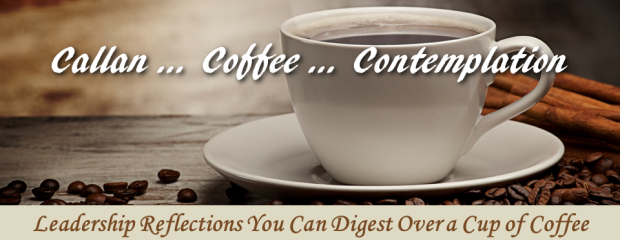Callan…Coffee…Contemplation for the Week of February 3rd
Heroic Leaders Focus on Virtues
I find it compelling (and telling) that Aesop’s Fables, written by an ancient Greek who lived in the 6th
century BC, remain so relevant today. I believe Aesop’s Fables endure, even in our modern world, because Aesop wrote principally about virtues, not values. There is nothing wrong with values, per se; however, values tend to be of thinner substance than virtues. Values can be situational, relative, and easily won or abandoned. Think of it: Anyone can have values, even criminals, gangs, and despots. Virtues are sturdier because virtues require personal judgment; often require personal sacrifice and moral courage to uphold; take time to master and turn into habits; and point to timeless wisdom anchored in humanity’s most noble aspirations. By anchoring ourselves on classic virtues
such as honor, courage, service, wisdom, altruism, and merit, these virtues help form a sturdy bulwark against what Lincoln called “the silent artillery of time” and thus help us stand most upright when times get tough.
Why Ethos is the Key to Organizational Excellence
Ethos is a Greek word meaning “the essential character or spirit of a group.” Ethos is the deep perennial knowledge and communal roots that define the spirit of a people. Ethos is what is passed from generation to generation to form a deep sense of common identity, common purpose, and common reference. When alive and thriving, ethos provides to the group answer to these three elementary question: Who are we? What do we do? What do we stand for? Ethos is akin to the underground root system of a tree, in that ethos is the life-blood and wellspring of the organization’s enduring health, vitality, and resilience. When ethos is built and sustained by leaders, ethos protects the organization from living solely in a present-tense culture, allowing the organization to feel its past in the wind while confidently looking forward towards the future. Ethos is a affect image…touching hearts and souls in a deep and powerful way, and as such ethos instructs, informs, galvanizes, and reinforces cultural expectations and aspirations.
Heroic Leaders Embrace Paradox
Leadership is a master craft, and like all master crafts, gaining true excellence in leadership requires embracing paradox. Not everything about leadership is linear or simple. Heroic leaders, in mastering themselves and gaining true inner authority, have to accept and internalize leadership paradoxes such as these:
- To get, you must give
- To excel, you must release power
- To speed up, you must slow down
- To lead others, you must master yourself
- To win, you must occasionally fail
- To detect, you must reflect
- To integrate, you must disintegrate
- To get hard results, you must master soft skills
- The higher you go, the less you need to know (technically)
Heroic Leaders Avoid the Slippery Slope
Like Odysseus in Homer’s Odyssey, all leaders will occasionally be lured by the siren’s call to the shores of ignoble behavior. It is tempting to follow the siren’s call and step onto the slippery slope towards our lesser ambitions, and when we do, we end up crashing on the shore and shipwrecking our integrity, our honor, and our trustworthiness. When leaders step on the slippery slope, they fall prey to these toxic mindsets and behaviors:
- Convenience
- Instant Gratification
- Victimization
- Cynicism
- Rights without Responsibility
- Entitlement without Sacrifice
Like Odysseus before us, we must lash ourselves to the mast of moral courage, avoid the slippery slope, and chart a wiser course to uphold our integrity and our honor.
Heroic Leaders Understand the Necessity of “No”
Like the mythic Pandora, leaders often mistake success as saying “yes” to everything. And like Pandora, when leaders lift the lid of the box and say “yes” to everything, they unleash a torrent of unfocused tasks and misguided energy that results in chaos and confusion. Why do leaders often fall prey to this Pandora effect and focus on doing more and more and more? Because of the chimera of activity and business! When leaders perceive busyness, they automatically correlate that busyness to production and effectiveness, which is often the opposite of what is actually achieved. Busyness and unfocused energy creates dissipation, not focus! Heroic leaders therefore understand the necessity of saying “no.” Heroic leaders must discipline themselves, and their organization, to focus on their ethos, their core strategy, and their ultimate end states, and say “no” to things that do not align with these core purposes. Great leaders instill in themselves and their organizations a willingness to ask these crucial questions: What should we stop doing? What should we never do? In this way, leaders foster a discipline for “no” and create healthy mechanisms for removal.
Check back next Monday for a round up of this week’s social media shares. Or check us out on Facebook, Twitter, Google+, or Pinterest to see our posts every day!
Tweet Share






